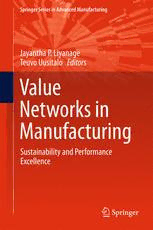Table Of ContentSpringer Series in Advanced Manufacturing
Jayantha P. Liyanage
Teuvo Uusitalo Editors
Value
Networks in
Manufacturing
Sustainability and Performance
Excellence
Springer Series in Advanced Manufacturing
Series editor
Duc Truong Pham, Birmingham, UK
More information about this series at http://www.springer.com/series/7113
Jayantha P. Liyanage Teuvo Uusitalo
(cid:129)
Editors
Value Networks
in Manufacturing
Sustainability and Performance Excellence
123
Editors
JayanthaP. Liyanage Teuvo Uusitalo
University of Stavanger VTTTechnical Research Centre ofFinland
Stavanger Tampere
Norway Finland
ISSN 1860-5168 ISSN 2196-1735 (electronic)
SpringerSeries inAdvancedManufacturing
ISBN978-3-319-27797-4 ISBN978-3-319-27799-8 (eBook)
DOI 10.1007/978-3-319-27799-8
LibraryofCongressControlNumber:2016940797
©SpringerInternationalPublishingSwitzerland2017
Thisworkissubjecttocopyright.AllrightsarereservedbythePublisher,whetherthewholeorpart
of the material is concerned, specifically the rights of translation, reprinting, reuse of illustrations,
recitation, broadcasting, reproduction on microfilms or in any other physical way, and transmission
or information storage and retrieval, electronic adaptation, computer software, or by similar or
dissimilarmethodologynowknownorhereafterdeveloped.
The use of general descriptive names, registered names, trademarks, service marks, etc. in this
publication does not imply, even in the absence of a specific statement, that such names are exempt
fromtherelevantprotectivelawsandregulationsandthereforefreeforgeneraluse.
The publisher, the authors and the editors are safe to assume that the advice and information in this
book are believed to be true and accurate at the date of publication. Neither the publisher nor the
authors or the editors give a warranty, express or implied, with respect to the material contained
hereinorforanyerrorsoromissionsthatmayhavebeenmade.
Printedonacid-freepaper
ThisSpringerimprintispublishedbySpringerNature
TheregisteredcompanyisSpringerInternationalPublishingAGSwitzerland
ThisbookisdedicatedtotheR&Dteamofthe
EU Project ‘SustainValue’, their beloved
families, and affiliations for continuous
commitment, creativity, and teamwork.
Preface
The significance of the manufacturing industry in Europe is widely known and
accepted.Manufacturingcompaniesgenerate,directlyandthroughservices,wealth
and jobs in all European countries. Globalization has activated a novel industrial
revolution,leadingtoanewworldwidedistributionofproductionandmarkets.The
increasing demands for sustainability, at the same time, have created new chal-
lenges and emerging opportunities for society and for business. The traditional
trans-national manufacturing product and service delivery solutions cannot be
sustainedinbusinessenvironments,wheregrowingtradevolumesandcommercial
operational patterns impose significant environmental challenges across Europe.
Hence, a radical shift is required, with industry being in a key position to pursue
sustainable consumption and production solutions.
Much of the opportunity to address sustainability rests on enhanced network
management. Leading companies are looking for new approaches to manage
sustainabilityimpactseffectively.Ifmanufacturingnetworkpartnersdonotmanage
the future challenges around regulation, reporting and compliance assurance,
scarcity of resources, or the effects of climate change on their business, then their
abilitytooperateasanetworkpartnercouldbedramaticallyaffected.Thiscouldbe
fatal to their business.
Tobesuccessfulinthischangingbusiness environment,manufacturers mustbe
pro-active. Industrial practitioners need to be creative in recognizing the opportu-
nities that the sustainable economy will present for the development of new
products, the identification of changes in markets, and for optimizing their oper-
ating network.
Enterprisesmusttakeintoconsiderationnotonlytheeconomicgoalsbutalsothe
need to meet environmental and social goals in conducting business, recognizing
that economic, environmental and social impacts occur at all stages in the value
network. This requires managing the internal activities and operations of the pro-
ducing organization and ensuring that all value network partners follow the same
principles and performance standards that have an influence on the sustainable
product and service delivery performance. Sustainable value creation is the key
vii
viii Preface
contribution of enterprises to sustainability, i.e. to create long-term environmental,
socialandeconomicvalue.Individualbusinessescannotdeliverthesystemchanges
requiredatthevaluenetworklevel.Collaborationamongpartnerscanandmustbe
enabled by developing attractive and common approaches for sustainable produc-
tion and services.
The existing business models are mostly based on creating, delivering and
capturing economic value for customers and shareholders, with limited or no
attention paid to environmental and social value and a broader range of stake-
holders.Thesetraditionalbusinessmodelsarebasedonlinearindustrialmodelsthat
externalizeenvironmentalandsocialimpacts.Thesecannotsupportthesustainable
business creation that is required to meet the future needs of the planet and of
increasingly discerning customers, who want features other than economic value.
Where environmental and social value has been created by firms, it is often
through compliance with regulations or corporate social responsibility programs.
Whileimportant,theseapproacheshavenotgenerallyembeddedsustainabilityinto
the core of the business, and as such their impact is often limited. The changing
business environment, wider range of stakeholders engaging in the debate over
industry, resource limitations and the emphasis on the social responsibilities of
firmshaveraisedtheneedforbusinessmodelinnovationtointegratesustainability
more fully into the core of the business.
The above observations demonstrate the importance of providing tools and
methodologiestomaximizesustainabilityincompanies,showinghowthebusiness
canbeimprovedbyusingsustainableguidelines.Italsoemphasizestheimportance
of doing this at the network level, as the impacts do not mainly occur inside the
final Original Equipment Manufacturer (OEM) business. Nevertheless, OEMs are
key players because they specify designs and materials, select suppliers and
co-ordinate networks.
Sustainabilityisbecomingacentralfactorincompanies’long-termcompetitive-
nessandworkinginthiswaywillaffecttheirvaluenetworks.Theinvolvedbusiness
partnersareintegratedwithinseveralnetworks,makingplanning,coordinationand
managementatediousandchallengingtask.Thedecisionmakingsettinginparticular
bringschallengesduetothedecentralizednatureofbusinessdecisionsandoperational
activities.Inthiscontext,amajorimpactonthenetworkedproductionenvironments
couldbeachievedthroughholisticandintegratedsolutionsforthesustainabilityof
complexvaluenetworks,ratherthanthroughisolatedoradhocsolutions.
This book is based on the results of the SustainValue (Sustainable Value
Creation in Manufacturing Networks) project, which was a small-scale collabora-
tive project within the EU 7th Framework Programme. This three-year project
beganonApril1,2011withatotalbudgetof4millioneuros,ofwhichthefunding
from the European Commission was 2.8 million euros. The overall aim of the
Preface ix
project was to develop industrial models, solutions and performance standards
for new sustainable and higher-performing production and service networks.
In principle, it aimed at:
1. enhancinggovernanceandbusinessmodelsthatenabletheactiveintegrationof
dynamic and complex production systems working towards cooperative and
sustainable value-adding business networks,
2. simplifying the adoption of sustainable approaches, business models and solu-
tionsprovidingsustainabilityandperformanceKPIstogetherwithguidelinesfor
implementation,
3. delivering a new methodology that supports sustainable, competitive and
customer-oriented life cycle decisions on products and services in complex
production systems,
4. supporting compliance verification processes for continuous improvement by
developingsustainabilityassuranceperformancestandardsforcomplexbusiness
processes in integrated production and service networks.
This book brings various important perspectives into spotlight, together with a
number of techniques and methods that can help support the manufacturing sector
to explore new avenues in economic, social, and environmental terms in emerging
networked business environments.
Stavanger, Norway Jayantha P. Liyanage
Tampere, Finland Teuvo Uusitalo
Acknowledgements
Thisbookisbasedona3-yearEuropeanprojecttitled‘Sustainablevaluecreationin
Manufacturing networks (SustainValue)’, conducted in 2011–2014 period.
Research and development activities were carried out by a consortium of part-
ners consisting of the following organizations: VTT Technical Research Centre of
Finland; Politecnico di Milano, Italy; University of Cambridge, UK; Centre for
Industrialassetmanagement(CIAM)ofUniversityofStavanger,Norway;Institute
for Industrial Management at the RWTH Aachen University, Germany; German
Institute for Standardisation (DIN), Germany; FIDIA, Italy; Riversimple,
UK; CLAAS, Germany; and Elcon Solutions, Finland.
TheresearchprojectreceivedfundingfromtheEuropeanCommunity’sSeventh
Framework Programme (FP7, 2007–2013) under grant agreement 262931.
This book is a result of the EU project. The authors of the book deeply
acknowledge all the consortium partners and the European Commission for their
support.
xi

